#interlink publishing
Explore tagged Tumblr posts
Text

This ferret and his human are still shouting FREE PALESTINE
#thebookferret#books#booklr#book worm#book nerd#book pets#book addict#book photography#bibliophile#ferret#ferrets of tumblr#pets of tumblr#wasabi#free palestine#kuffiyeh#kuffiyeh pin#interlink publishing#earring for reem
106 notes
·
View notes
Text

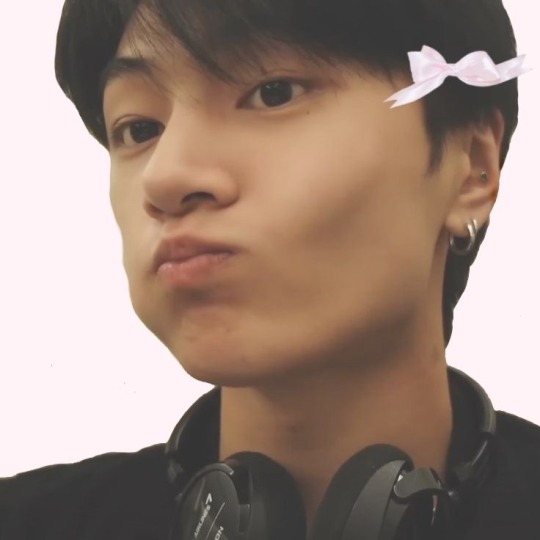

제이! boyfie! jay x reader 🗒️ synopsis boyfriend jay plays with your hair and cuddling you because you cried until you felt safe and went back to sleep. warning. very sad and short :,(
# (separation anxiety at its finest.)

“I’m back home pretty, let me see your gorgeous face.” your boyfriend, jay, was busy today. he left early, and to your surprise, he came back home late. and your separation anxiety definitely did not help. you found nights without jay empty, not just because you were alone, but you felt empty when your other half wasn’t in sight. “love?” jay called out to you, but you didn’t reply as he was still looking for you.
he would expect you to be in YOUR spot on the big couch you guys shared, laying down while eating your favorite ice cream tub, watching the kdrama you wait weeks for a new episode. but no, it seemed like tonight was different. it was like you didn’t wait for jay. and that was rare, because jay knew how much you would miss him at night so that’s why he would try to come home as fast as possible to kiss you and cuddle you endlessly.
jay quietly strolled to your guy’s room, peeping through the gap in the door and to his expectation, you were curled up into a ball. covered by the comforter that barely even covered anything, seeming like you were cold.
jay smirked, he found you cute. he thought, maybe, you just went to sleep because you were exhausted and tired. so you just gave in and went to bed, “even when your snoring, your gorgeous.” he giggled, getting on the bed slowly approaching you. he intended to kiss you on the lips and express his love, however; with his sharp hearing, he heard your sniffling. hiccups. he was a tad bit stunned, he didn’t know how to react if you were crying. “oh my baby.. look at me.” he said so.. so soft. so gentle. with all the care he could ever use.
you slowly turned to him, revealing your red puffy eyes. you cried, it devastated him. “my poor baby, why are you crying? you shouldn’t cry.” he cupped your face, bringing you closer to his face. “I’m hideous right now, jay. I just cried, so I don’t look my best.” you looked down and frowned, a bit embarrassed. “hideous? fuck, love. never call yourself that. that shouldn’t even be in your vocabulary. your crying over here, but all I can think of right now is how your so pretty when you cry.”
“now come over here, I’ll show you how much I care.” jay opened his arms and you immediately came to him, engulfing into his warm presence. he held you, so close. as if you guys were interlinked. jay didn’t want you to cry, he wanted you to know he loved you.
“oh baby don’t cry.. your too precious.” he wiped your tears, looking at you with so much love. you were rested on his chest, and he softly and slowly rubbing your back, his lips were near your ears, and when his voice touched your ears, it felt warm and tingly.
jay started playing with your hair, removing the hair from your face and tucking it behind your ear. “don’t cry anymore. I’m here.”
“pretty, pretty girl.”

@ jwnstars !! sigh. why isn’t he my bf.
I FORGOT TO POST/PUBLISH THIS. this has been sitting in my drafts unfinished. I feel like this is one of my most detailed works bc I fricking suck lmao 😿🎀
#enhypen#enhypen fluff#enhypen imagine#enhypen scenarios#enhypen x reader#enhypen fan fiction#enhypen drabbles#jay enhypen x you#jay enhypen x y/n#jay enha#jay enhypen x reader#jay x reader#jay enhypen#enhypen jay#jay park au#jay park#jay enhypen drabble#jay drabbles
331 notes
·
View notes
Text
This could potentially be big. Screenshots from someone in a Facebook group providing his professionally-affected opinion:

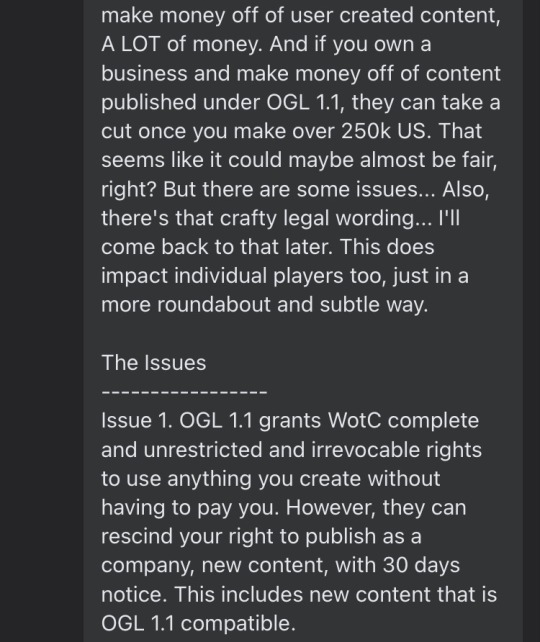
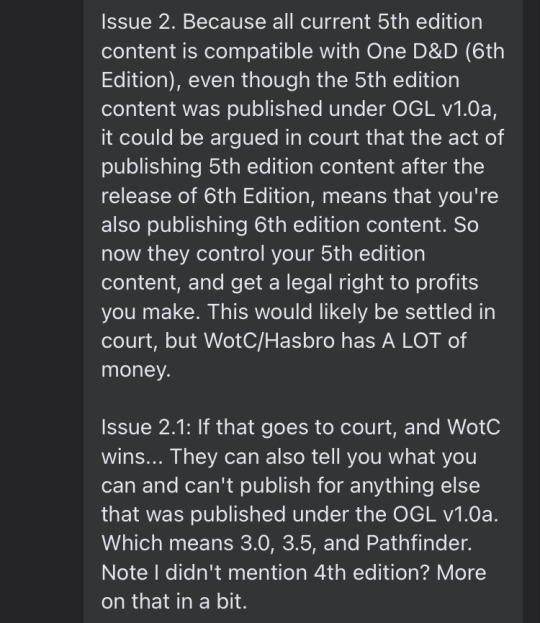

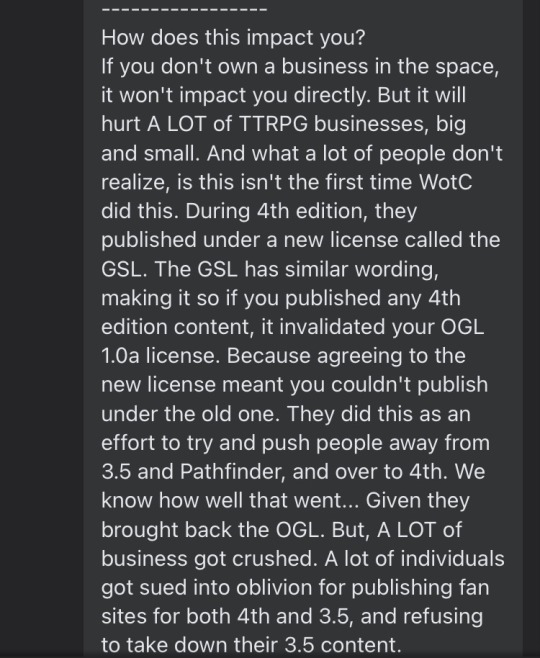
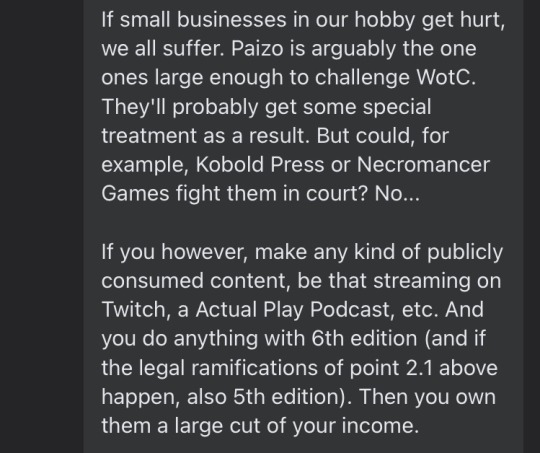

Basically, if any of this is true, you could expect Paizo et al to sue WotC/Hasbro. I would love to see that happen, personally, but it all depends on how likely any of the above actually is to work. Like, if 5.5/6e turns out to be as crappy as 4e was, this will just be WotC shooting itself in the foot again (though probably not enough to kill it). So far, I've only heard good things mechanically and bad things for the playerbase, but they have all been vague suggestions with no concrete details.
A Concrete Example
The Hypertext d20 SRD was constructed under 3.5 as exactly what its name suggests: a self-interlinked reference document for everything in the system. Prior to its existence, the SRD was a collection of (possibly rich) text documents without page numbers or other means of easy reference. The Hypertext SRD included all OGL material from print sources it could find, so includes ~85% of the Player's Handbook, Dungeon Master's Guide, Monster Manual, Expanded Psionics Handbook, Epic Level Handbook, Arcana Unearthed, and some bits from Deities & Demigods. It has other useful tools, like an encounter calculator and spell search. For the longest time, it was the only thing like it. Other sites (DnD Tools, Forgotten Realms Helps) eventually sprang up with more content; DnD Tools has been taken down numerous times for violating the OGL, while Realms Helps has stayed under the radar for some reason.
At some point, the d20srd webmaster updated it to include Pathfinder (seemingly all, but arranged by book like how Paizo's PRD was, which is deeply unhelpful) and some 5e (limited entirely to the core three books). This was long after d20pfsrd launched; that site is modeled off of the 3.5 d20srd site in organization and is amazeballs.
Since this webmaster has published 5e material on this site and since the new OGL possibly interprets that as accepting its terms, if this new OGL were legal, he could be sued to take down his entire site (or at least the perennially helpful portions) because it is no longer valid. (Per the screenshots, this is only half hypothetical: I know WotC did do this when 4e came out to fanpages that had 3.5 and 4e material because they didn't want competition from their own product.) This would leave only unauthorized (DnD Tools) or status unclear (Forgotten Realms Helps) archives. We've already lost reams of 3.5 material because WotC deleted its 3rd ed. archives (they used to publish stuff online regularly).
1K notes
·
View notes
Text
You don’t have to thank me
Originally published on my wattpad: slvt4em1lyprenti2s
Summary: Emily is feeling a little insecure so reader comforts her.
Word Count: 1.1k
Fluff
Pairings: Emily Prentiss x fem!reader
!NOT PROOFREAD!
You and Emily are dating in secret (even though the team has basically figured it out)
Reader pov:
Today we had the bitchiest little boy in custody. Well, he wasn't a little boy, he was a fully grown man who needs to learn some basic manners and how to act his age.
He was caught red handed - literally - we caught him mid-stabbing the victim (who thankfully we saved) with blood all over his hand. And yet he still denied he did anything.
I'm going to smack his smug little face into the wall.
"Hey you okay over there?" I hear Derek say to me that snaps me out of my fantasies of beating the crap outta this guy.
"Yeah. I'm fine, this guy is just pissing me off. Classic misogynist just like we profiled but goddamn. I didn't think anyone could be this bad." I let out an exasperated sigh as Morgan sat down in the chair next to me.
"You know, I've seen you deal with much bigger dickheads than this guy, and you've been totally fine. You know what I think has gotten under your skin so much?" He smirks lightly as he's talking which makes me hesitant to ask what.
"What? Please do enlighten me." I say trying to stop myself from rolling me eyes at the shit-eating grin he has on his face.
"I think it's because he insulted your little girlfriend." I blush at the mention of Emily and he picks up on it instantly.
"I knew it! Hey, I'm not judging but, I think it may have gotten under her skin too so, go find her! Make her happy." He says with this time a genuine smile on his face as I stand up.
"Just not too happy." There it is. He's back.
"Ha, ha. Will do, but really. Thanks for letting me know." I reply as I walk away.
While I was walking I got held up in my thoughts a bit. Had that dig about her hair really got to her? I mean not that she's not allowed to be vulnerable but, I thought she loved it? Is she not happy with it?
I'm snapped out of my thoughts as I've reached the meeting room she's in. As if on autopilot I close the door behind me as I step in and walk over and sit on the chair next to her.
"Hi honey." She mumbles without even looking up, already knowing it was me. She was looking over the case file but, I could tell her head was somewhere else.
"Hey, how are you doing?" I was trying not to push her too much but I need to be able to help her if she is upset so before she could answer I continued. "Morgan told me you were a bit upset, you know, about what the UnSub said. If you are, which you shouldn't be because he's an arse, I just want to let you know that you are absolutely stunning my love and nothing can ever, and will never change that okay?" By this point she's turned her chair so our knees are interlinked and I've grasped her hands as she looks me in the eyes.
"I'm uhm- I'm not okay." she murmured tearily. I could see the older woman fighting back the tears threatening to spill and my heart breaks. How could someone so incredible, in every aspect of their life, feel so down about themselves?
"That's okay love, I'm proud of you for admitting that." I smile and squeeze her hands signalling for her to continue explaining why she's upset.
"The things he said, about my hair and looking old. They really got to me and I don't know why. I just- in all honesty I've never been sure about my decision to stop dying my hair. I mean I don't regret as such I just wish I didn't look so old. I feel like I look like a little old lady and most of all, it's made me think I don't deserve to be with you. You're quite a bit younger than me and you're gorgeous and, me? I'm none of that. So what he said today, just solidified those feeling." By the time she had finished I was wiping the last of her tears off of her cheeks. My heart aches for her and I wished she could see herself the way I see her.
"Sweetheart, please listen to me carefully when I say this. You are the most beautiful woman I know, and you do not look old, you look sexy and trust me, everyone thinks so. You're absolutely stunning em and I honestly wish you could see that. Nothing that twat said today is true, so don't listen to those thoughts saying you're not beautiful or not worthy because you are my love. Please believe me when I say it, let it go in one ear and out the other okay? And if anything, I don't deserve to be with you. You're the most precious person I've ever known and that fact I get to be your girlfriend is the best thing that's ever happened to me. You know what I need and when I need it, you know what I like and what I don't, and you love with your whole heart and Emily, you'll always be my girl no matter what okay?" As I finished my speech she instantly pulled me into a kiss.
It was slow and sensual, we poured all the emotions we had built up over that day into that kiss but most importantly, it showed me that she believed me. That she loves me and I love her, more than anything in this world.
As we pulled apart my hand was still on her cheek, my thumb caressing her cheekbone. We just sat there for a bit, looking at each other and basking in the other presence before she gently pulled me into a hug.
It was like it was two puzzle pieces slotting together. Her embrace was so comforting and I always feel safe whenever I'm in her arms.
I pull away and look her in the eye.
"C'mon, let's pack up and get on the jet as soon as we can so we can go home." I say as I take her hand and pull her to her feet after au stand up.
She presses a soft kiss to my lips before she pulls away and looks me deep in the eyes.
"Love?" She speak softly.
"Yes?" I say.
"Thank you, I love you so much. I don't know what I would do without you." she replied, her voice barely above a whisper.
"You don't have to thank me honey, it's what I'm here for. I love you too."
#emily prentiss x reader#emily prentiss#emily prentiss x you#emily prentiss x y/n#emily prentiss x female reader#wlw#lesbian#sapphic#lesbian pride#wlw fanfic#wlw pride#criminal minds#bau#criminal minds fanfiction#criminal minds fic
132 notes
·
View notes
Text
It is a positive fact that I must rely on myself entirely now—that I must build up a strong world within myself, so rich and so full that it will be enough. I must find all things in myself, create them. I must reach my own climaxes of strength and creation with my work.
— Anais Nin, June 11, 1930. Journals of Anais Nin 1927-1931 [volume 4] (Interlink Publishing, January 1, 1979)
53 notes
·
View notes
Text
Published by the Palestine Research Center in Beirut in 1978, just four years before it was looted and later bombed by Zionist forces during their occupation of Lebanon, Zionist Relations with Nazi Germany is a neglected study of a topic that has been suppressed in the mainstream to such an extent it has become virtually a taboo. Over four decades have passed since the publication of this concise and powerful book and it has remained mostly unnoticed, uncited, and unknown. Yet it should be essential reading, since it provides crucial historical context on Zionism and its relationship with European fascism. This historical context shows Zionism to be an ideology and movement that is indisputably fascist in character, from the time of its collaboration with European fascist forces right up to the present moment, and for the duration of its ongoing campaign of genocidal violence against the Palestinian people, which began more than 75 years ago. Zionist Relations with Nazi Germany can therefore be read in two interlinked ways: 1) for its historical evidence about the Zionist movement’s repressed history and 2) as a study that engages in the ideological battle against Zionism, confronting its racist and false self-representation as a movement for the salvation of all Jewish people.
[...]
Zionist Relations with Nazi Germany is a short book, totalling just eighty-five pages. Given the complexity and sensitivity of the topic under discussion, Glubb does an impressive job of summarising his argument cogently, using a range of sources by Jewish authors such as the anti-Zionist Moshe Menuhin, whose perspectives had been – and remain – neglected and suppressed. What is equally important too is that while Glubb’s text is a searing historical indictment of the Zionist movement’s connections to Nazism, it is also a commemoration of Jewish anti-fascist resistance.
130 notes
·
View notes
Note
Did medieval people eat three times a day or just when they were hungry because I heard the three meals per day was an modern American thing?
I love food questions. I did a lot of food culture research regarding heresy, which sounds out of left field, but what people had to give typically was food. That's how they'd support heretics (and Franciscans alike). What they have and what they give and how they give it reveals a lot.
The real answer is the Middle Ages consists of 1000 years of history across a continent with very diverse practices and sometimes distinct social norms depending on class or 'profession.' To say categorically that three meals weren't consumed is false. But it's equally false to say three meals was the norm everywhere and always, or two, or casual smaller meals with snacking.
For example, you'll see historians definitively say snacking between the established meal times was absolutely a no-no because it was considered sinful, and while that was strictly believed and followed in certain classes (or groups) in certain regions at certain points in the Middle Ages, it's absolutely NOT the case in High Medieval Southern France, where the culture definitely followed the Mediterranean model. Hospitality and food were hopelessly interlinked. If someone dropped by your house, it didn't matter what time it was, you were offering them food. Across all classes.
There are these variations across Europe today. In some parts of Europe, you absolutely are going to be served food if you visit, regardless of the time of day, whereas in other parts (particularly as you head north), you probably won't be offered food. Likewise, in some part of Europe, they eat 3 meals, in others they don't.
A lot of times historians will take published medieval sermon books and reach conclusions about the practices or beliefs of the day without taking into account that the content of sermons probably consisted of the very things they were doing rather than categorically rejecting as sinful. The sermons do inform us about the beliefs of the church. The actions they sermonize about were the things that irked clergymen, who had their own standards they wanted to impose. So, if you were being told in sermons how sinful snacking is? There's probably a lot of snacking going on and your local clergyman hates it. Otherwise, they wouldn't mention it. It's not universally the case, the clergy do have weird (almost fetishistic) obsessions that probably weren't rooted in fact, but it's a fair assumption we can learn about the realities of life from sermons with the less weird stuff.
So, while in some regions at some points in the Middle Ages, you'd expect only two meals--no breakfast, largest meal at lunchtime, in other regions the three meal system dominated. Or the biggest meal was in the evening! It depended on the work you were doing or the region. Lords would be more likely to eat breakfast than not. In fact, often lords were set up with food in the chambers so they could eat during the night. So, in that case, they broke their fast long before 'breakfast.' Which sort of plays into the theory of two sleeps.
We often don't have the kind of records we'd like for middle and peasant classes, but it's all about looking in the right places. We find interesting stuff in criminal testimonies (and inquisitorial records). We know they'd get up in the night and have sex and commit crimes together based on testimonies, and you better believe they'd want a snack after.
34 notes
·
View notes
Text
Do they keep you in a cell? Cells. When you're not performing your duties do they keep you in a little box? Cells. Interlinked. What's it like to hold the hand of someone you love? Interlinked. Do they teach you how to feel finger to finger? Interlinked. Do you long for having your heart interlinked? Interlinked. Do you dream about being interlinked? Have they left a place for you where you can dream? Interlinked. What's it like to hold your child in your arms? Interlinked. What's it like to play with your dog? Interlinked. Do you feel that there's a part of you that's missing? Interlinked. Do you like to connect to things? Interlinked. What happens when that linkage is broken? Interlinked. Have they let you feel heartbreak? Interlinked. Did you buy a present for the person you love? Within cells interlinked. Why don't you say that three times? Within cells interlinked. Within cells interlinked. Within cells interlinked.
— The post-traumatic baseline test from "Blade Runner 2049", written by Ryan Gosling (excerpt). Published in "The art and soul of Blade Runner 2049".
27 notes
·
View notes
Text
Why the next pandemic could come from the Arctic — and what to do about it - Published Sept 4, 2024
By: Christian Sonne
Only a unified approach across disciplines can reduce the underappreciated threat of emerging diseases arising in the north.
The Arctic is under stress, that much is known. Between 1979 and 2021, the region warmed four times faster than the global average, with effects — as yet poorly understood — on its ecology and ability to store carbon, on global sea levels and on wider ocean-circulation and weather patterns.
Add in the effects of biodiversity loss and pollution, and people often refer to a triple planetary crisis. I think we should actually be talking about a quadruple crisis. Since starting research in the Arctic in 1997, I have spent nearly all of my summers there, monitoring changes in pollution levels, habitats and food webs using a ‘One Health’ approach that integrates effects on wildlife, humans and ecosystems. And it’s becoming clear that, as the Arctic warms, its environment degrades and human activities increase, new health threats are emerging. In particular, the Arctic is likely to become a hotbed for zoonotic diseases that spill over into humans from other animals. That threat was brought home to all of us by the COVID-19 pandemic. We need to take seriously the possibility that the next pandemic could come from the north.
Some 60% of emerging infectious diseases are zoonotic. Their emergence and spillover is in general highly interlinked with habitat degradation, biodiversity loss and food-web changes — all of which are present in the Arctic. But a warming Arctic harbours other risks. As sea ice thaws, ‘forever chemicals’ are increasingly being transported into Arctic environments. These include mercury, per- and polyfluoroalkyl substances and polychlorinated biphenyls, all known to modulate human and animal immune systems and increase vulnerability to respiratory infections. Invasive fish and whale species are also bringing in industrial chemicals and their own diseases.
The pathogens enter an environment in which some native species, such as polar bears (Ursus maritimus), have not been exposed to them, and so are at increased risk. The release of ancient microorganisms long frozen in ice and sediments as the landscape thaws adds to this danger: humans and other wildlife are likely to lack any immune defences against them.
These risk factors are set to increase. The first ice-free Arctic summers could come as early as the 2030s. The Arctic Ocean has huge potential for energy, fishery and tourism sectors, and is not subject to any global treaty regulating its exploitation. Further wildlife disturbance, pollution, overfishing and jurisdictional conflicts are the likely result.
The current perception is that the Arctic possesses relatively low microbial activity. Compared with temperate and tropical latitudes, many fewer resources are devoted to studying zoonoses in the Arctic, with sparse surveillance for emerging threats in most areas. This needs to change — taking account of human, animal and wider environmental perspectives.
When it comes to logistics, low-tech is high-tech in the Arctic. On the human side, Canadian researchers have already started taking samples from sewage and other sources that can easily be analysed for the presence of viral pathogens. This kind of approach should be combined with better access to community health care, clinical inspections and consultations with local doctors. A particular flash point is the handling and consumption of raw or dried animal meat in subsistence-hunting communities. Hygiene courses, meat inspection and better disease surveillance developed in partnership with those communities can help to both sustain food security and prevent spillover events.
On the wildlife side, long-term finance is needed for yearly and seasonal surveillance programmes. These schemes should collaborate with local communities using existing techniques that don’t rely on technologies such as cryogenics and so are easy to use in situ. Such activities could be embedded into the ongoing Arctic Council monitoring and assessment programmes on pollution, biodiversity and climate change, as laid out in the council’s ‘One Arctic, One Health’ project.
On the broader environmental front, efforts to reduce pollution, safeguard biodiversity and reduce greenhouse-gas emissions through international agreements play their part. Efforts spearheaded by various Arctic Council working groups, and other initiatives such as the ongoing negotiations for a United Nations-backed treaty on plastic pollution, show how intergovernmental and interdisciplinary collaboration across public health, biodiversity conservation, pollution and food security can help with achieving sustainability.
To make a true difference, there is need for a broader Arctic monitoring and assessment plan, underpinned by treaty, that combines surveillance of pollution and of disease. This is currently difficult to achieve through the Arctic Council, given the absence of Russia and Russian data since the country’s invasion of Ukraine in 2022. A better opportunity to establish a holistic understanding and action plan might be afforded by the proposed pandemic-preparedness treaty, currently under negotiation at the World Health Organization. This could build on the efforts of almost 200 globally recognized One Health Networks, including those in the Arctic.
Action must be taken now. If it isn’t, it will become more difficult to mitigate wildlife interactions and diagnose, treat and isolate people with an infection — and the risk of a future pandemic with an Arctic ground zero will only increase.
Nature 633, 10 (2024)
doi: doi.org/10.1038/d41586-024-02830-7
6 notes
·
View notes
Text
Lit Hub: How From Here to Eternity Contradicted Post-War America’s Wholesome Notions

From Here to Eternity was published between the release of the controversial first Kinsey Report (1948’s “Sexual Behavior in the Human Male”) and its scandalously received sequel, “Sexual Behavior in the Human Female,” in 1953. News stories reported reactions of shock, dismay, denial, and disgust as the Kinsey Reports’ charts about extramarital sex, masturbation, and queer orientations contradicted America’s postwar self-image and its proprieties. The love between Prewitt and Lorene is as doomed as the adulterous liaison between Sergeant Warden and Karen Holmes. It’s a wonder that Jones’s bold, rough, grimly realistic narrative managed to get published when it did (by Scribner, no less). A saturation novel in the densely textured tradition of Theodore Dreiser, the book is still shocking for its evocation of relentless hazing and the stockade’s brutalities, as well as the profanity-laced lingo of enlisted Army men. But the dueling tales of star-crossed lovers offer readers an abundance of human yearning and emotional sensitivity. It just happens that the men are in uniform. From Here to Eternity was not the only postwar bestseller contradicting America’s wholesome notions. In 1947, an audacious debut novel called The Gallery appeared. It was written by John Horne Burns, an ex-G.I. who served during World War II in North Africa and Italy. He was the opposite of Jones, in one respect: John Horne Burns was gay. Both authors presented intimate, intelligent portraits of characters whose quests for love bring them much suffering (as well as moments of joy and episodes of bliss). What profoundly connects their debut novels is that both Burns and Jones managed, in the epoch of Presidents Truman and Eisenhower, to write about sexual taboos, and specifically gay characters and gay encounters, despite that epoch’s rampant homophobia and the military milieus of their respective books. As for The Gallery, a unique novel comprised of 17 interlinked stories, only three (“Momma,” “The Leaf,” and “Queen Penicillin”) present gay male soldiers. Nonetheless, to do so in 1947 was nearly impossible; it was also hazardous to John Horne Burns’s fledgling career. Burns enfolds his boldest lines deep within the book. At the very end of “Momma” (the eponymous character presides over a gay bar in Naples), a British sergeant remarks to a fellow officer that they’re all “expressing a desire disapproved of by society. But in relation to the world of 1944, this is just a bunch of gay people letting down their back hair…” No movie was made of The Gallery, and so no iconic images exist to rival the beach scene in From Here to Eternity. But in Burns’s writing, he creates prose portraits akin to those magic moments on the beach. “She bent down and laid her mouth against his temple, passing down to his lips,” Burns wrote in “Moe,” the final chapter of The Gallery, as a G.I. and his Neapolitan lover say farewell. “There was no pressure in her kiss, but it sealed a wild peace he’d been feeling with her all evening. Her kiss made him hers…” (Full article)
#james jones#from here to eternity#john horne burns#literature#lit#gay literature#lgbt literature#lgbtq literature#gay books#gay fiction#gay#mlm#lgbt#lgbtq#lgbtqia#bookblr
9 notes
·
View notes
Note
I think it was you that posted an article which went through and debunked each of the TRA counterpoints/arguments to and claims about the Cass Report. I’ve been looking for it for about an hour now and I can’t track it down. Do you know what I’m referring to?
There are a few possibilities because there's been so much disinformation spread around by activists.
The first and most important one is probably the official response from the Cass team in the form of an FAQ which came out soon after the review was published.
https://religion-is-a-mental-illness.tumblr.com/post/748882979721543680
There's also been several interviews with Hilary Cass herself addressing the myths and misinformation.
https://religion-is-a-mental-illness.tumblr.com/post/750174000988225536
https://religion-is-a-mental-illness.tumblr.com/post/750604785112252416
Journalist Ben Ryan has written extensively about the "firehose of lies" coming from activists, especially known pathological liars and shills, such as Anthony "Erin" Reed and Alejandro "Alejandra" Caraballo, whose claims are so egregious they cannot be dismissed as mere misunderstanding or misconception. His coverage tends to be very extensive, not to mention interlinked, so it's a bit hard to navigate sometimes:
https://religion-is-a-mental-illness.tumblr.com/post/748701836936101888
https://religion-is-a-mental-illness.tumblr.com/post/748520590360576000
Andy L also has a list of myths and lies. You can go to his Quackometer page to see updates that have been made since his original myths list.
https://religion-is-a-mental-illness.tumblr.com/post/747886457979633664
Those are the most relevant ones I can think of/find. If you were thinking of another one not listed above, let me know and I'll dig a little further.
8 notes
·
View notes
Text
There’s a lot of speculation about what the beginning of BTSV would be like. I like the idea that the film will start off with the Comics Code Authority (CCA) symbol getting graffitied on (maybe with the Spider-Man symbol Miles spray painted for his ITSV suit). I also like the idea of seeing Miles G’s origins getting revealed in the intro. But if these two events happen in the beginning of BTSV, and occur in this sequence, I wonder if they would be interlinked with each other? In other words, maybe the vandalization of the Comics Code Authority is what allows Miles G’s story to get told.
For some background, the CCA was a self-regulating program used by comic book publishers to monitor content in comics due to moral panic over how comics “corrupted” children. One rule imposed by this code is that “Crimes shall never be presented” in a way for criminals to be portrayed as sympathetic (General Standards,. Part A, Rule 1). On ATSV’s first watch, one could assume that Miles G would be a villain due to him being the Prowler. But, the release of the ATSV art book reveals that Miles G is actually a vigilante and is his universe’s only form of protection against crime. This reveal of Miles G being a vigilante would likely occur in BTSV; however, due to him assuming the Prowler mantle, an established criminal in the Spiderverse trilogy, the CCA would have never released this story due to the Prowler’s criminal ties.
Thus, if the CCA were to get vandalized, BTSV would not have to follow the code’s rule that criminals can never be shown as sympathetic. Instead, the audience will likely learn about Miles G’s origins and why he felt the need to become a vigilante to protect his home of Brooklyn. Then the audience will come to sympathize with Miles G not just for his motives but also for him as a person as we see his similarities to our Miles, the boy we’ve grown to love over the course of the trilogy. Overall, the vandalization of the CCA would allow the story of the Prowler, a tragic criminal, and Miles G, an Afro-Latino kid from crime stricken Brooklyn, to get told and be seen as heroes in their own right.
24 notes
·
View notes
Text
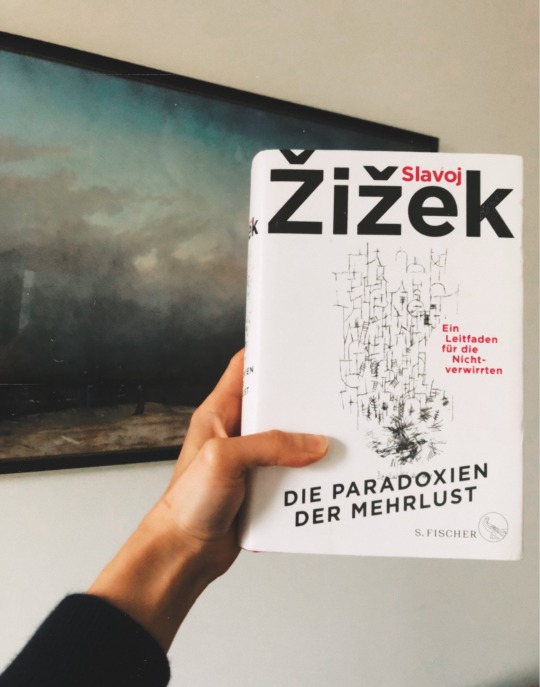
A short introduction of a Big Thinker- Meant to share, not to represent the wide fields he is dealing since the 1980s: Slavoj Zizek .


Platon dreamt of a state, led by philosophers and Zizek is kind of transposing this idea with the party Troika in Slovenia, together with two other philosophers.
Zizek, a critical and maybe unconventional thinker of our time, combing psychological methods of Lacan with the dialectic of Hegel (also Zizek tries to re-connect the Lacain rejection of philosophy). Making philosophy not only relevant in pop-cultural way, but also as a system of making an opinion in order to analyze the differences arousing in political conflicts, in historical-dialectic process. Zizek is opening discourse that is interlinking different disciplines, also connecting media as examples for underlining his point. Showing a critical understantment of happenings, that are often the product of ideology. Drawing attention of phenomena that is suppressed by media in order to let the audience in a dogmatic black-and-white-thinking, like an article published in the New York Times in 2014, where survivors of the Shoa are condemning 'the massacre of Palestinians in Gaza and the ongoing occupation and colonization of historic Palestine'. Likewise the paradox that whenever global finances crash, the stock markets register an upswing (quoting Yanis Varoufakis). Also that we do not live in a system of capitalism, more appropriate: In a Neo-Feudalism of Companies and that all groups that reject this system (mostly Islam influenced communites, but also indigenious folks..) are in the same breath presented in an anti-democratic behavior... Still I am shaked, when reading about the PR-work behind the justification of the Iraq-war and I recommend to read Zizek's work "The Borrowed Kettle" in which he is tracing the geo-political intentions behind this war. As Zizek emphasizes continously: The catastrophy has happened, but we haven't recognized. Prima facie it is some kind of uncomfortable to see and hear him speaking (touching his nose and snorting, speaking not fluently and his rhetoric skills…), when used to read him. So it was a mental work for me to 'comprehend' his theories without being extracted by those superficialities, as for my opinion, there was and is a link of fineness of in- and outside. But this is exactly the work and therapeutic aim behind Zizek, to accept our own discomfort, when hearing him, to look more into the deepness of some sentences, that seem to been thrown out a gut-feeling, but is more the work of critical analysis, not clinging into political directions of right and left, but showing the fatality in both. A stand point that is missed in the politcal discourse. It will stay a fragment to present all those enlightening ideas and summaries of Zizek, as he had also the time and experience to built his world-view around a historic-philosophic-psychological order. Not always I can agree on his ideas (e.g. ciritsing the criticers of Eurocentric methods as hypocratical, because in his opinion, the methods of critism are rooting in 'pure European thinking', but I have my problems by locating the human consciousness in one contitent, as we can not divide the reciproce influences from all time and areas, like the 'European heritage of Ancient Greece' would have been lost without the mental work in Toledo, also a wonderful proof in history how all religious were able to work together ; Also I miss a critical analysis of the Covid-pandemia in a Foucault-Bio-Power-way, not to negate the danger of the virus, but the methods of politcal practice.) But this is exactly what a good conversation must include, approach the 'truth' through discussions and disagreements.
21 notes
·
View notes
Text
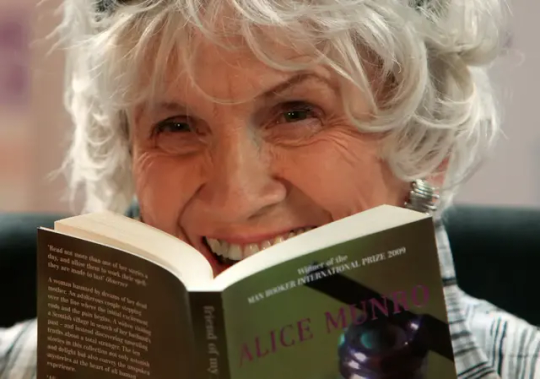
Alice Munro
Canadian short-story writer who won the Nobel prize in 2013 and was often likened to Chekhov and Guy de Maupassant
Few writers have possessed the short-story format as thoroughly as the Canadian author and Nobel laureate Alice Munro, who has died aged 92.
Although her early years as a writer were clouded by the feeling, partly the result of pressure from her publishers, that she should concentrate on producing a novel, she never embraced that genre.
Her one attempt, Lives of Girls and Women (1971), is more accurately described as a collection of interlinking tales. Throughout her career, she developed this method of cross-referencing stories and continuing themes and characters across a collection, most notably in The Beggar Maid (published in Canada as Who Do You Think You Are?), which was nominated for the Booker prize in 1980, and in the Juliet stories of the epiphanic collection Runaway (2004).
For Munro, short stories were the result of practical considerations, rather than choice. As Alice Laidlaw, she had won a scholarship to the University of Western Ontario, but left after two years to marry James Munro at the age of 20; she gave birth to her first child at 22 and later played an important role in running a bookstore in Victoria, British Columbia, with her husband.
Trying simultaneously to establish herself as a writer (she had her first story published in an undergraduate magazine in 1950 and sold a piece to the Canadian Broadcasting Corporation in 1951), she had no time for novel-writing. The short story it had to be.
Routinely likened to Chekhov and Guy de Maupassant, Munro was more radical than the comparison implies. AS Byatt, a longstanding admirer, described how reading Munro made her want to try short fiction herself. Munro stretched and challenged the genre. Not only does she consistently wrongfoot the reader, overturning our expectations of characters and their actions, but she melds several narrative strands together, bringing into one tale several plots.
Jakarta (from The Love of a Good Woman, 1998) is a good example of this method, which has prompted the frequent observation that Munro’s short stories are novels in miniature. Jakarta starts with Kath and Sonje on the beach with Kath’s baby, trying to avoid the disapproving eyes of a group of overly domesticated mothers they have nicknamed the Monicas. Kath and Sonje, in contrast, discuss DH Lawrence and their own lives; clearly these two independent-minded women want more from life than marriage and motherhood seem to offer.
This was familiar ground for Munro, who wrote extensively and sensitively of women’s sexual awakening, escape from dull and politically incompatible husbands, and excruciating separation from children.
The surprise of Jakarta comes when Munro moves forward in time to visit Sonje as she is now, widowed and about to sell her Oregon dance school. It is not Kath who drops in on her inspirational friend, but Kent, Kath’s long divorced and boorish husband, taking with him wife No 3. The story then turns back to cover Kath’s mental disentanglement from her marriage, as well as Sonje’s own travails.
Elsewhere, Munro’s narrative shocks lie in cunning juxtaposition and scandalous honesty. In Five Points (in Friend of My Youth, 1990), Maria, a lonely schoolgirl, bankrupts her immigrant family by using the profits from their shop to pay local boys for sexual favours. Her story is recounted by Neil, the “boyish man beginning to age”, with whom married Brenda has been enjoying an affair. As Neil recalls Maria, Brenda and he stumble into their first argument and their own relationship moves to another, more complex, level. The story recalls the brutal realism of Raymond Carver as much as the American gothic of Carson McCullers.
Like Five Points, the magnificent title story of Hateship, Friendship, Courtship, Loveship, Marriage (2001) is an exercise in what could be termed Canadian gothic.
The apparently dull-witted heroine, Johanna Parry (“No beauty queen, ever”), appears for much of the story to be heading for tragedy. She leaves her position as a housekeeper, tricked into believing she has an offer of marriage by the malicious letter writing of two schoolgirls. But the force of her delusion, not to mention her personality, makes that marriage come about, and life with her husband, once a drunken bankrupt, a success.
At the close of the story it is Edith, one of the letter writers, who feels foolish and confused, and Johanna who has transcended expectations. Munro’s penultimate and bleakest work, Too Much Happiness (2009), sees characters facing infanticide, cancer and sexual perversion, with Munro working against anticipated outcomes in much the same way.
Munro said of her fiction: “There is always a starting point in reality.” Her own starting point was the town of Wingham, Huron County, Ontario, where she was born, to Anne (nee Chamney), a former schoolteacher, and Robert Laidlaw, a fox farmer. They are frequent presences in her stories, as is the town, which appears variously renamed as Jubilee, Dalgleish, Hanratty, Logan, Carstairs and Walley.
Much of her fiction is closely tied to the smalltown farming communities of the area with whom she identified (she once described herself as “educated to be a farmer’s wife”).
On her marriage to James in 1951, Munro moved away, first to Vancouver, but after her divorce in 1972 she returned to Ontario, eventually settling with her second husband, the geographer Gerald Fremlin, whom she married in 1976, in Clinton, only about 20 miles from Wingham.
The View from Castle Rock (2006) contains some of Munro’s most personal stories, drawing on pieces she had been working on for years about her family history. It is an account of the pioneers from whose stock she came (her ancestors, the Scottish Presbyterian Laidlaws and the Irish Anglican Chamneys, were among the first settlers in Upper Canada in the early 19th century). But it is also something of a love letter to Ontario, a record of disappearing towns and a disappearing way of life.
A writer’s writer, Munro reached international critical attention when her work began to feature in the New Yorker, from 1977, and she continued to be feted: her last work, Dear Life (2012), published when she was 81, was as strongly received as any other. Indeed, the near tragedy of the opening story, To Reach Japan, and the frank reflections on death and dementia in Dolly and In Sight of the Lake suggest a writer undiminished by age. But she shunned the literary limelight, claiming that she knew of her shortlisting for the Nobel, awarded in 2013, only the day before the prize was announced.
The esteem in which she was held was evident in the genuine, warm response from writers around the world, including her compatriot Margaret Atwood, who described Munro’s win as a “magnificent occasion”. Munro’s own reaction was self-effacing. In a statement issued through her publishers, she said: “I am particularly glad that winning this award will please so many Canadians. I am happy too that this will bring more attention to Canadian writing.” She also noted that the prize was “a wonderful thing for the short story”.
Munro constantly distanced her life from her fiction. “Some of these stories are closer to my own life than others are, but not one of them is as close as people seem to think,” she wrote in the introduction to The Moons of Jupiter (1982).
It is easy to see why the two can become confused, however. Castle Rock reveals the roots of several of her fictions, such as A Wilderness Station (Open Secrets, 1994), which takes as its starting point the death of one of her ancestors, felled by a tree. Later she would describe the four final stories of Dear Life as “the closest things I have to say about my own life”. Interestingly, the focus of this raw quartet is childhood trauma and the mother figure. Her own mother died in 1959 after 20 years of Parkinson’s disease.
Munro’s approach to writing meant that any basis in reality was distorted in the long process of refining and rewriting her work (her manuscripts, she said, were long, loose screeds). Who Do You Think You Are? was pulled from the press at the author’s insistence (and her own expense) one month before publication, and half the book reorganised and rewritten.
Munro had constantly experimented with first- and third-person narratives during its creation, and worried whether the real focus of her writing was Rose (the subject of many stories) or another character, Janet. Her perfectionism paid off: like her first publication, Dance of the Happy Shades (1968), and The Progress of Love (1986), Who Do You Think You Are? won the governor general’s award for fiction in Canada. In 2009, unusually for a short story writer, she won the Man Booker International prize for her overall contribution to fiction.
Her sparkling intelligence, sly humour and sense of narrative marked her out as one of the outstanding authors of her generation. Her long service to the short story made Munro important, and this was recognised in reviews of Lying Under the Apple Tree (2011), a selection of her stories. Writers seldom really change the direction of a genre: she did.
Fremlin died in 2013. With her first husband she had four daughters, one of whom, Catherine, died shortly after birth. Munro is survived by her daughters Sheila, Jenny and Andrea.
🔔 Alice Ann Munro, writer, born 10 July 1931; died 13 May 2024
Daily inspiration. Discover more photos at Just for Books…?
10 notes
·
View notes
Text
Hey friends!
A new work, Joy of the Wishmasters by Void_Ink_Studios, was published today, with 1/? Chapters released! It has a rating of Teen And Up Audiences and No Archive Warnings Apply, with additional tags "Kid Fic, Parenthood, learning how to parent, Tags May Change, Other Additional Tags to Be Added, Mpreg, Is it mpreg if they're hermaphorditic?, Ehh I'll tag it just in case, It's not dwelled on, Sequel to fanfic, They're both trying their best but they're way out of their element, but for very different reasons, Implied Sexual Content"
You can read it here:
This chapter is also on Tumblr! You can find it here :].
NSFW works are below the cut :].
The Ghostwriter, by Irina_94, was updated today, with 6/? Chapters released! It has a rating of Mature and No Archive Warnings Apply, with additional tags "Alternate Universe - Human, Emotional Hurt/Comfort, Fluff, Aromantic Character, Asexual Character, Prismo needs a huge, References to Depression, Anxiety, Grief/Mourning, Trigger warnings when necessary"
You can read it here:
A new work, "How many times have I told you? You can't visit me here." by Buggaboo321, was published today, with 1/1 Chapters released! It has a rating of Mature and Graphic Depictions Of Violence, and Major Character Death, with additional tags "OC's who don't matter, Human AU, Office AU, Some angst, Some sweet moments, Past History together, Friends to lovers to enemeies to lovers again, I don't know I went Crazy with this and it's only the tip of the iceberg"
You can read it here:
Interlinked, by Finn565, was updated today, with 6/13 Chapters released! It has a rating of Explicit and Graphic Depictions Of Violence, with additional tags "Human AU, Blade Runner AU, I played pretty lose with the lore so forgive me for that, Violence, not too gorey tho, Slow Burn, Enemies to Lovers, Orbo is a piece of shit, sorry I just made him that way in this fic"
You can read it here:
Loving Those Hips, by phoenixash234flames, was updated today, with 2/2 Chapters released! It has a rating of Explicit and No Archive Warnings Apply, with additional tags "Face-Sitting, Hand Jobs, Scarab deepthroating with his tongue, Teasing, Gentle Sex, distracting while prismo tries to do his job"
You can read it here:
Sans Soleil, by Cosmic_Rainstorm, was updated today, with 4/? Chapters released! It has a rating of Mature and Graphic Depictions Of Violence, with additional tags "Alternate Universe - Zombie Apocalypse, Blood and Injury, Minor Character Death, Grief/Mourning, Slow Burn, Idiots in Love, Angst, Fluff, Hurt/Comfort, Scarab has PTSD, Other Additional Tags to Be Added, babys first fic, No beta we die like Jake, Human AU, Kinda, As in Prismos hair will always be pink and idc, Broken Bones, Scarab has Chronic Pain, Swearing, smoking weed, Survivors Guilt, Mentions of Suicide, Mental Abuse, self worth issues, Coming Out, Unhealthy Coping Mechanisms, Depression, Mental Breakdown, healing infections through herbal treatments, is that a thing? cause it is in this, Gets worse before it gets better, infection/sickness, Blood and Gore, Violence"
You can read it here:
#prohibitedwish#prohibitedwish fics#the ghostwriter#“how many times have i told you? you can't visit me here.”#interlinked#joy of the wishmasters#loving those hips#sans soleil
16 notes
·
View notes
Text
wip game
thanks to @owlf45 for the tag!
RULES: post the names of all the files in your WIP folder, regardless of how non-descriptive or ridiculous. Let people send you an ask with the title that most intrigues them, and then post a little snippet or tell them something about it! and then tag as many people as you have WIPs.
Decided to cut out the stuff that’s been published since I’ve talked about those pretty extensively already and at this point i want to avoid spoilers. Also, everything from number 18 onward is original fiction ideas.
No Man’s Sky/Starfield au
Carried Soul
One for All Means Everyone
Aizawa thinks all might is bad/a predator
Toshinko week fic
Within Cells Interlinked
The Spin - The Turn part 2
Unfelt Imaginations
Kirin AU
Prop
Green Noise
Habitus
Mental Age
One for Infinite
Dekugate Spin-off
Wholesome Dadmight Camping Trip
Son of the Sun
Die Historic - Mad Max AU
The Humarise Kidnapping Fic
An Occurance in Christmastown
Pure Volumes, Pure Space
X Reader Horror
Warrior Cats with Dinosaurs
Ocean of Grass
I already know I’m gonna forget people to instead of embarrassing myself I’m gonna make this an open call so anyone who wants to can say I tagged them.
16 notes
·
View notes